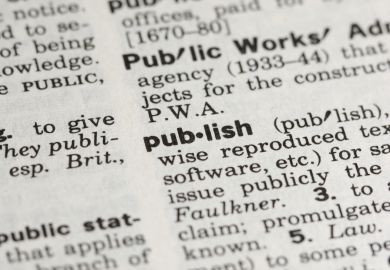I told you so! That was what came to my mind upon reading the news that several publishers have joined forces (in the Coalition for Responsible Sharing) to address copyright infringements on ResearchGate – a website that allows scholars to share their research with others.
I have been warning junior and senior researchers for the past four years, when promoting open access publishing, that sites such as ResearchGate and Academia.edu and the like should not be considered repositories – and that most of the content offered on these platforms is in violation of copyright agreements.
Don't get me wrong; I endorse open access and want to see more of it. And I, like many others, feel extremely frustrated at the unduly high article processing charges and the structural “double dipping” by some publishers.
But, in this instance, I can only conclude that the law is on the side of the publishers. When signing a publishing agreement, the terms of dissemination are explained in detail. Signing implies agreement to these terms. A recent study by H. R. Jamali found that 51 per cent of 392 non-open access articles infringed copyright. If I were a publisher, I would also want to see some redress.
However, if only things were that simple. The amusing, but very telling case of Londoners agreeing to give up their firstborn child in exchange for free Wi-Fi as a result of not reading the terms and conditions is a sign of the crucial underlying issue. Who ever reads all the text in a standard agreement? And of those who do, how many actually understand the terms and conditions referred to?
To give an example of one such clause:
“Authors will be asked to sign a transfer of copyright agreement. We accept that some authors are unable to transfer copyright. However, such policies do not provide anyone other than the (publisher) the right to make in any form facsimile copies of the version printed.
“Gold open access articles are published under Creative Commons licensing, which enables authors to retain copyright while allowing others to copy, distribute, and make some uses of their work, provided full credit is given to them as originators. Authors will be offered a choice of two licences (CC BY or CC BY-NC-ND) depending on whether or not they wish to allow commercial reuse of their work and whether or not they wish to allow others to alter their work in the course of its reuse. Authors will be asked to sign an exclusive licence (or non-exclusive licence for government employees) to permit our publisher to publish the work. All requests to reproduce or make available anything in the journal—in whole or in part, in electronic or in any other form, including translation—should be made through our XXX Service.”
Well now, that’s clear, isn’t it?
Leaving aside the fact that usually only the corresponding author actually sees the agreement, can we really expect that an average researcher or research administrator knows what transferring copyright means, or what gold or green open access is, what a licence is (let alone an exclusive one), and what is meant by CC-BY-NC-ND? My experience is that, no, we cannot just assume this – a feeling shared by open access expert Richard Poynder in his February 2017 blog.
Being offered the chance to publish your results, especially in highly esteemed journals, is often such a victory in itself that nothing else matters. As one senior researcher once told me: “I want to publish, I need to publish, I don’t care about my copyright.”
Is it really a surprise that so many “illegal” copies find their way to platforms that seemingly offer great opportunities for extra visibility and increased networking, often just by clicking the “yes, this is my publication” button?
It shouldn't be. Many researchers who have posted copyright-protected content on ResearchGate and other sites seem stunned now they have been told that what they have done breaks the rules. It is not an issue of active infringement (although I am sure some are aware that they are doing just that), but of ignorance.
So how do we deal with this? Doling out punishment after the deed has been done will not gain any sympathy. And there is only so much that library staff and research administrators can do in making researchers aware of copyright issues – both in terms of explaining the language and of warning against just signing away copyright. There’s a principle that would truly help all of us, and could substantially reduce the need for take-down-notices: the KISS-principle (keep it simple, stupid).
Publishers: inform researchers who are signing your agreements about their rights and duties in layman’s terms. Why not just say: “If you sign this, you are not allowed to post this article on any platform where just anybody can read it: not on your website, not on ResearchGate, Academia.edu and the like, not in your repository. You should also inform you co-authors of this restriction”. Add this text in bold to the agreements as a short summary (analogous to what the EC does in its Guidelines to the Rules on Open Access to Scientific Publications and Open Access to Research Data in Horizon 2020), and I believe that the number of copyright infringements will be reduced.
But then again, maybe publishers are not the kissing kind.
Hannelore Vanhaverbeke is head of the Data and Analysis unit at KU Leuven.
Register to continue
Why register?
- Registration is free and only takes a moment
- Once registered, you can read 3 articles a month
- Sign up for our newsletter
Subscribe
Or subscribe for unlimited access to:
- Unlimited access to news, views, insights & reviews
- Digital editions
- Digital access to THE’s university and college rankings analysis
Already registered or a current subscriber?









